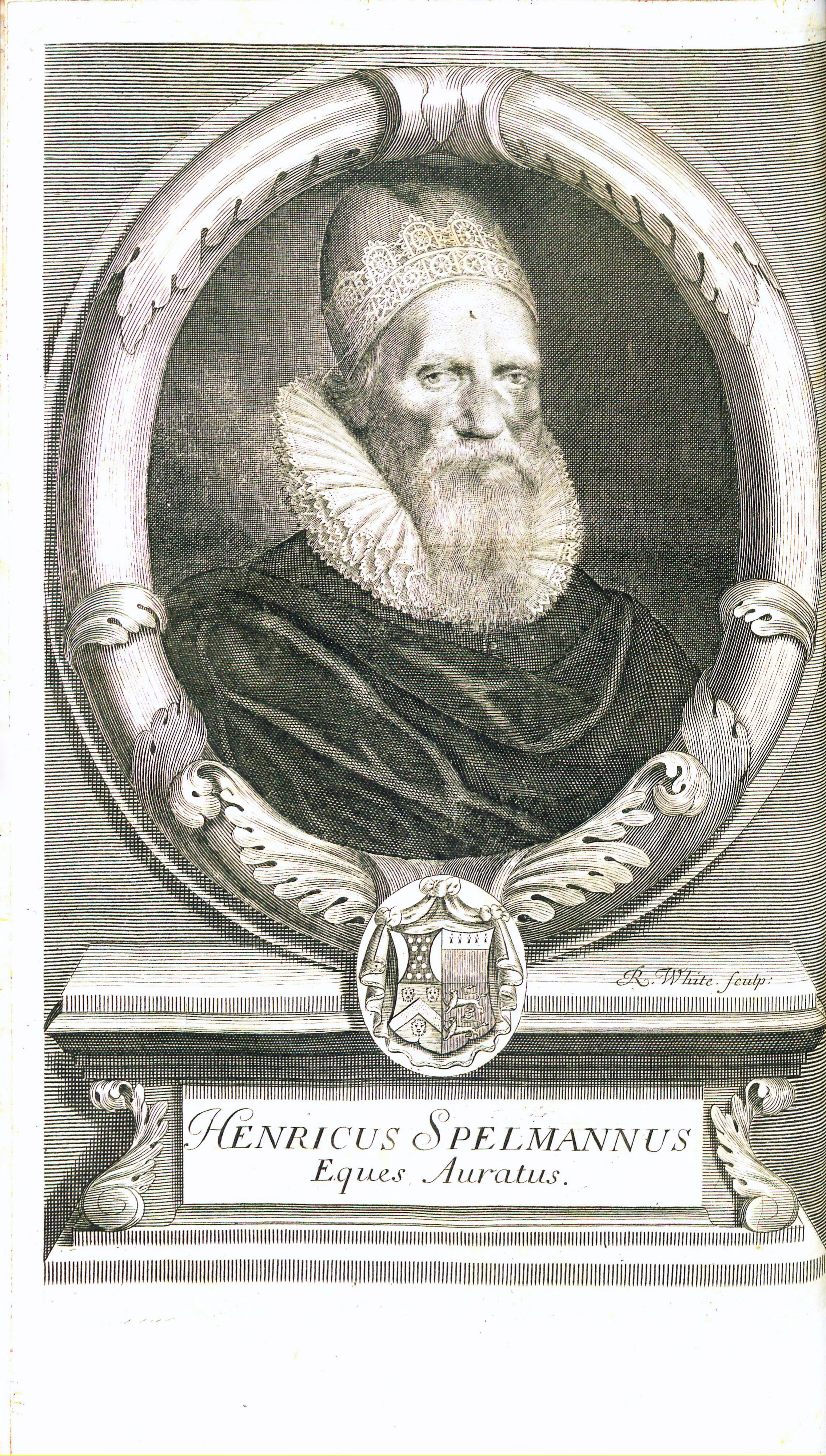Difference between revisions of "English Works of Sir Henry Spelman"
| Line 16: | Line 16: | ||
|desc=Folio (34 cm.) | |desc=Folio (34 cm.) | ||
}}[[File:SpelmanEnglishWorksOfSirHenrySpelman1723Frontispiece.jpg|left|thumb|250px|<center>Frontispiece.</center>]] | }}[[File:SpelmanEnglishWorksOfSirHenrySpelman1723Frontispiece.jpg|left|thumb|250px|<center>Frontispiece.</center>]] | ||
| − | [http://en.wikipedia.org/wiki/Henry_Spelman Sir Henry Spelman] (1563/4–1641) studied at Walsigner grammar school and graduated BA from Trinity College, Cambridge in 1583.<ref>Stuart Handley, [http://www.oxforddnb.com/view/article/26104 "Spelman, Sir Henry (1563/4–1641)"] in ''Oxford Dictionary of National Biography'' (Oxford University Press, 2004- ), accessed October 9, 2013.</ref> He was admitted to [http://en.wikipedia.org/wiki/Lincoln%27s_Inn Lincoln’s Inn] in 1586 where he studied the law for three years. Spelman found drudgery in many aspects of the law, and focused on history and antiquity.<ref>Ibid.</ref> He married his wife Eleanor in 1590 and soon after began writing treatises.<br /> | + | [http://en.wikipedia.org/wiki/Henry_Spelman Sir Henry Spelman] (1563/4–1641) studied at Walsigner grammar school and graduated BA from [http://en.wikipedia.org/wiki/Trinity_College,_Cambridge Trinity College, Cambridge] in 1583.<ref>Stuart Handley, [http://www.oxforddnb.com/view/article/26104 "Spelman, Sir Henry (1563/4–1641)"] in ''Oxford Dictionary of National Biography'' (Oxford University Press, 2004- ), accessed October 9, 2013.</ref> He was admitted to [http://en.wikipedia.org/wiki/Lincoln%27s_Inn Lincoln’s Inn] in 1586, where he studied the law for three years. Spelman found drudgery in many aspects of the law, and focused on history and antiquity.<ref>Ibid.</ref> He married his wife Eleanor in 1590 and soon after began writing treatises.<br /> |
<br /> | <br /> | ||
| − | Spelman wrote treatises on many topics.<ref>Ibid.</ref> As time passed, his work gained recognition, especially with regard to his ability present not only the mere facts, but to connect seemingly unrelated facts in a meaningful and persuasive manner.<ref>Ibid.</ref> He is recognized as having laid a foundation upon which subsequent scholars were able to build.<ref>Ibid.</ref> | + | Spelman wrote treatises on many topics.<ref>Ibid.</ref> As time passed, his work gained recognition, especially with regard to his ability to present not only the mere facts, but to connect seemingly unrelated facts in a meaningful and persuasive manner.<ref>Ibid.</ref> He is recognized as having laid a foundation upon which subsequent scholars were able to build.<ref>Ibid.</ref> |
==Evidence for Inclusion in Wythe's Library== | ==Evidence for Inclusion in Wythe's Library== | ||
Revision as of 14:25, 20 March 2014
The English Works of Sir Henry Spelman, Kt. Publish'd in His Life-Time; Together with His Posthumous Works, Relating to the Laws and Antiquities of England; First Publish'd by the Present Lord Bishop of Lincoln, in the Year 1695, Together with the Life of the Author, Now Revised by His Lordship. to Which are Added, Two More Treatises of Sir Henry Spelman, Never Before Printed: One, of the Admiral-Jurisdiction, and the Officers Thereof: the Other, of Antient Deeds and Charters, with a Compleat Index to the Whole
by Sir Henry Spelman
| English Works of Sir Henry Spelman | |
|
Title page from English Works of Sir Henry Spelman, George Wythe Collection, Wolf Law Library, College of William & Mary. | |
| Author | Sir Henry Spelman |
| Editor | Edmund Gibson |
| Published | London: Printed for D. Browne, sen. & jun. W. Mears, F. Clay [etc.] |
| Date | 1723 |
| Language | English |
| Volumes | 2 parts in 1 volume set |
| Desc. | Folio (34 cm.) |
Sir Henry Spelman (1563/4–1641) studied at Walsigner grammar school and graduated BA from Trinity College, Cambridge in 1583.[1] He was admitted to Lincoln’s Inn in 1586, where he studied the law for three years. Spelman found drudgery in many aspects of the law, and focused on history and antiquity.[2] He married his wife Eleanor in 1590 and soon after began writing treatises.
Spelman wrote treatises on many topics.[3] As time passed, his work gained recognition, especially with regard to his ability to present not only the mere facts, but to connect seemingly unrelated facts in a meaningful and persuasive manner.[4] He is recognized as having laid a foundation upon which subsequent scholars were able to build.[5]
Evidence for Inclusion in Wythe's Library
Wythe referred to Spelman's works in his case report for Field v. Harrison, "Sir H. Spelman somewhere condemns the common lawyers of his own time, for the small acquaintance they had with the principles and rationale of their profession."[6] Brown's Bibliography[7] includes the first (1723) edition of The English Works of Sir Henry Spelman as the work intended by Wythe's reference. He bases the selection of this title and edition in part on the copy Thomas Jefferson sold to the Library of Congress in 1815.[8] The Wolf Law Library followed Brown's suggestion and purchased a copy of the same edition.
Description of the Wolf Law Library's copy
Bound in contemporary decorative leather binding. Spine has six bands with gilt decoration and lettering. Purchased from Longland Books.
View this book in William & Mary's online catalog.
References
- ↑ Stuart Handley, "Spelman, Sir Henry (1563/4–1641)" in Oxford Dictionary of National Biography (Oxford University Press, 2004- ), accessed October 9, 2013.
- ↑ Ibid.
- ↑ Ibid.
- ↑ Ibid.
- ↑ Ibid.
- ↑ George Wythe, "A Report of the Case Between Field and Harrison Decreed by the High Court of Chancery in which the Decision was Reversed by the Court of Appeals (Richmond: Printed and Sold by Thomas Nicolson, 1796), 12, n.
- ↑ Bennie Brown, "The Library of George Wythe of Williamsburg and Richmond," (unpublished manuscript, May, 2012) Microsoft Word file. Earlier edition available at: https://digitalarchive.wm.edu/handle/10288/13433
- ↑ E. Millicent Sowerby, Catalogue of the Library of Thomas Jefferson, 2nd ed. (Charlottesville: University Press of Virginia, 1983), 3:125-126 [no.2721].
External Links
Read this book in Google Books.


